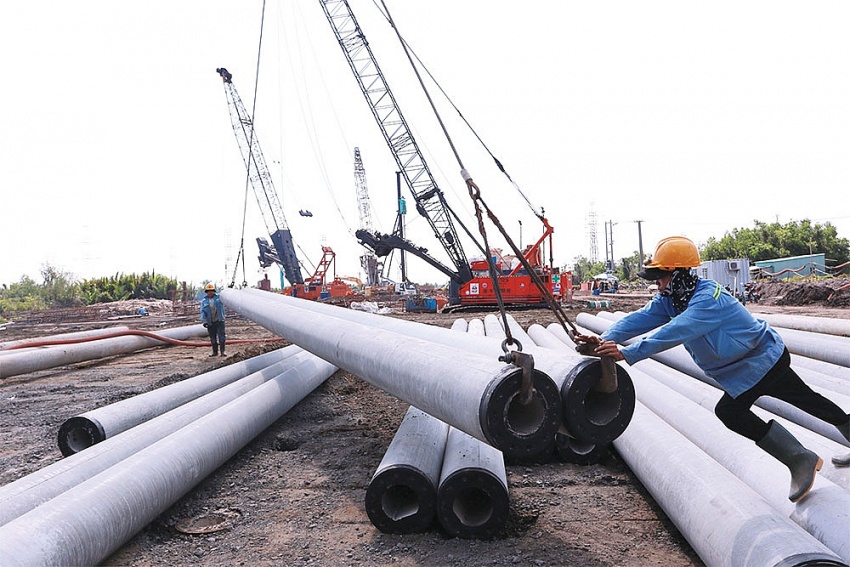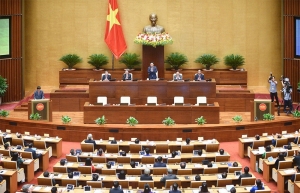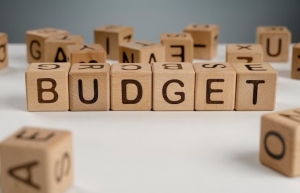State budget revenues under pressure amid tough economy
 |
| An expansion in public investment disbursement has contributed to a state budget overspending, photo Le Toan |
According to the Ministry of Finance’s (MoF) updated figures released last week, the first nine months of this year saw a state a budget deficit of $660 million, the first time the state coffers have witnessed such overspending since early this year. In the first eight months of 2023, there was a fiscal surplus of $1.83 billion.
The MoF ascribed the nine-month budget deficit to a rise in expenditures, which climbed 14.1 per cent on-year to an estimated $52.3 billion, or 59.7 per cent of the year’s plan. All types of expenditures increased.
Disbursement of public investment hit $15.33 billion – reaching 51.38 per cent of the initial plan. This is also the first year that the economy has seen a public investment disbursement exceed 50 per cent of the initial plan in the first nine months.
The nine-month disbursement rate last year was 46.7 per cent of the plan.
“This year’s nine-month disbursement recorded an on-year increase of nearly 5 per cent, a sum of about $4.64 billion, contributing to putting 659km of expressways into use,” said Party General Secretary Nguyen Phu Trong at the closing ceremony of the 13th Party Central Committee’s eighth plenum on October 8. “Many other important infrastructure projects are also being constructed.”
According to the MoF, in the first nine months of this year, total state budget revenues are estimated to reach $51.64 billion, equal to 75.5 per cent of the year’s plan, and down 8.3 per cent on-year.
In which domestic revenues are estimated to stand at nearly $42.8 billion, tantamount to 76 per cent of the year’s plan, and down 3.2 per cent on-year.
The nine-month revenues from crude oil, all coming from PetroVietnam, are estimated to sit at $1.94 billion, equal to 109.5 per cent of the year’s plan, but down 22.5 per cent as compared to the corresponding period last year.
PetroVietnam reported that in the first eight months, its total revenue was estimated to reach $24.3 billion, exceeding the initial plan of 27 per cent. Its contributions to the state budget sit at an estimated $3.8 billion, exceeding the whole-year goal by 16 per cent. PetroVietnam’s pre-tax profit is estimated to surpass the entire-year target by 8 per cent.
“PetroVietnam has made non-stop efforts in implementing various solutions to improve governance and production, and increase business activities to minimise disadvantages. In the first eight months of the year, almost all targets of the group were surpassed,” PetroVietnam said.
The MoF has also reported that in the first nine months, state budget revenues from export and import activities are estimated to reach more than $6.9 billion, equivalent to 68.5 per cent of the plan, and down 26.3 per cent on-year.
“This means enterprises are facing massive difficulties, and they have been finding it difficult to boost exports and imports,” the MoF said.
According to the General Statistics Office, Vietnam’s total nine-month export turnover touched $259.57 billion in the first nine months, down 8.2 per cent on-year. In which Vietnamese exporters earned $68.86 billion – down 5.7 per cent and accounting for 26.5 per cent of the country’s total export value; and foreign exporters took $190.81 billion (including crude oil exports) – down 9.1 per cent, and accounting for 73.5 per cent.
Mobile phones and their spare parts, about 90 per cent of which are from South Korea’s Samsung, are estimated to earn a nine-month export turnover of over $39 billion, down 13.4 per cent on-year. Thus, Samsung’s contribution to the state budget since early this year has decreased.
The same is also true of exports of electronics, computers, and their spare parts – which are mainly produced by foreign firms such as Samsung, LG, Jing Gong, and Daewoo Vietnam. Their nine-month export revenues are estimated to be nearly $42.2 billion, down 1.7 per cent on-year.
However, Party General Secretary Trong believes that though difficulties remain, the economy is bouncing back, making conditions more favourable for increasing the state budget.
“It is expected that in 2023, the state budget revenues can reach and even exceed the set target, while many policies have been implemented on exempting, reducing, and extending the payment time of many kinds of taxes and fees, and land use rents,” he said
According to the MoF, based on forecasts that there will be massive difficulties both at home and abroad, the state budget overspending in 2023 will likely be $19.8 billion, or 4.42 per cent of GDP.
The budget revenues this year are expected to be $70.46 billion, far lower than the realised figures of $77.6 billion last year.
Meanwhile, it is estimated that Vietnam’s total state budget expenditure this year will be about $90.26 billion – up 16.3 per cent compared to 2022 expenditure estimates.
“In the context that the world economy’s growth is forecasted to be slow down, while a number of major economies are facing with a danger of depression, a very high hike of prices of oil and input materials is creating big pressure to global inflation,” the MoF said.
“In addition, the political situation in the region and the wider world have become all the more complicated, coupled with climate change, natural disasters, and epidemics. All of these challenges have and will continue increasing risks and difficulties for the Vietnamese economy in 2023 and the country’s budget situation as well.”
| Revenue mobilisation efforts over the medium term are needed to reverse the trend of tax erosion and create space to bolster social spending and address infrastructure gaps. Tax revenues have been eroded since their peak in the late 2000s, in contrast to trends in regional peers (and despite Vietnam’s tax rates being close to peers’ average). Implementing the Tax System Reform Strategy 2021-2030 would help widen the tax base and enhance tax compliance. Reforms could include reducing exemptions and rationalising preferential regimes for foreign-invested enterprises, broadening the VAT base, and raising environmental tax and excise duties. The planned introduction of a unified property tax and a land registry would also be important. Strengthening the fiscal framework and budget processes would increase transparency and enhance the quality and effectiveness of fiscal policy. The budget process is weakened by overly conservative revenue projections in recent years. A budget based on realistic projections and assessment of risks would allow to better decide on the appropriate fiscal space and level of spending and debt, while increasing transparency. The scope and duration of permitted carry-over spending could be more limited and ensure that all spending is integrated in the budget process. It would be important to accelerate efforts to strengthen macro-fiscal capacity (projections, risk assessment, and impact of fiscal measures). Conducting expenditure reviews would help identify priorities and improve the quality of expenditures. Fiscal policy has ample space available to support growth and the most vulnerable, thanks to prudent policies. In the current environment, fiscal policy can be more effective in promoting domestic demand moving forward, given highly leveraged corporates and weak external demand. However, policy implementation should be stepped up, including by addressing bottlenecks in the public investment cycle. Ramping up social safety nets and cash transfers to the most vulnerable would help sustain more inclusive growth. Strengthening the budget processes would ensure the effectiveness and transparency of fiscal policy. Over the medium term, further efforts are warranted to mobilise revenues to bolster social spending and infrastructure investment. Source: International Monetary Fund |
 | Budget estimate shortcomings require modern fix The low-quality formulation of state budget revenue estimates needs to be improved, as it will continue having unwanted direct impacts on the country’s financial landscape. |
 | Revenue rises remain tough despite budget surplus Despite a surplus in the state budget this year so far, both revenues and expenditures are contracting in many economic sectors, with the former outnumbering the latter due to a lower-than-expected pace of developmental investment. |
 | Government teleconference with localities: tasks for remaining months heavy At the Government's teleconference with localities and the regular Cabinet meeting in Hanoi on July 4, the Ministry of Planning and Investment (MoPI) presented two growth scenarios for the third quarter and the whole year 2023, indicating that the tasks for the remaining months of this year are heavy, with a growth rate of 8.0 per cent or higher. |
What the stars mean:
★ Poor ★ ★ Promising ★★★ Good ★★★★ Very good ★★★★★ Exceptional
Related Contents
Latest News
More News
- 0.1 per cent tax proposed on each transfer of digital assets (February 05, 2026 | 17:27)
- Ministry of Finance tightens policy delivery at start of year (February 05, 2026 | 17:26)
- Vietnam steps up market reforms as FTSE Russell reviews upgrade progress (February 05, 2026 | 17:20)
- 2025 profits mixed amid strong energy and farming results (February 05, 2026 | 17:18)
- Cashless payments hit 28 times GDP in 2025 (February 04, 2026 | 18:09)
- SSIAM and DBJ launch Japan Vietnam Capital Fund (February 04, 2026 | 15:57)
- Banks target stronger profits, credit growth in 2026 (February 04, 2026 | 15:43)
- Vietnam on path to investment-grade rating (February 03, 2026 | 13:07)
- Consumer finance sector posts sharp profit growth (February 03, 2026 | 13:05)
- Insurance market building the next chapter of protection (February 02, 2026 | 11:16)

 Tag:
Tag:



















 Mobile Version
Mobile Version